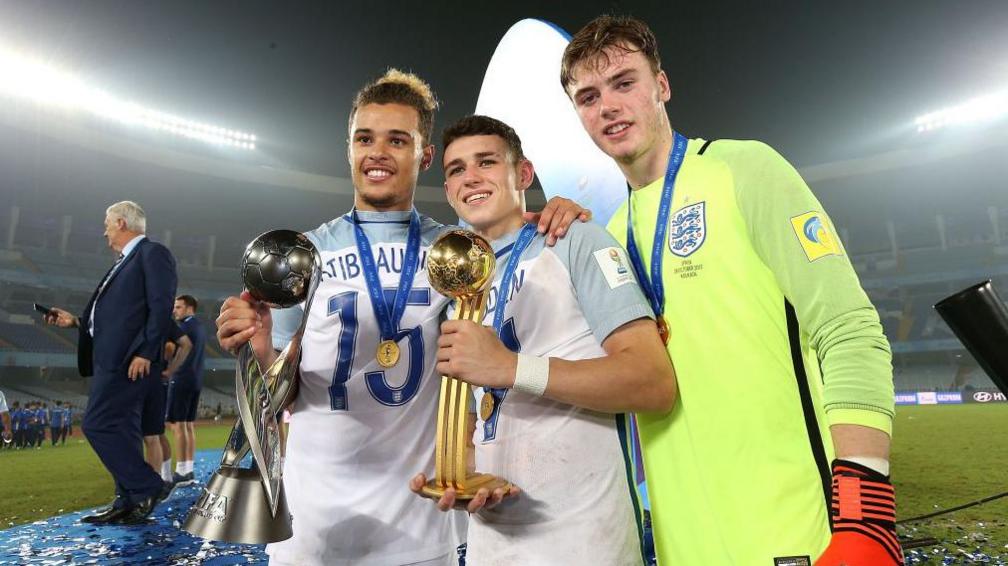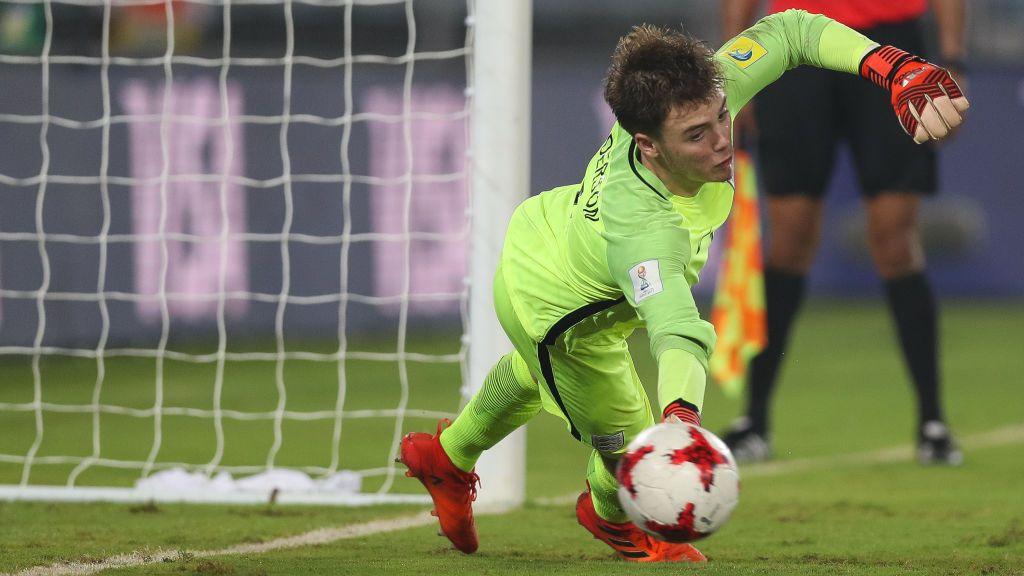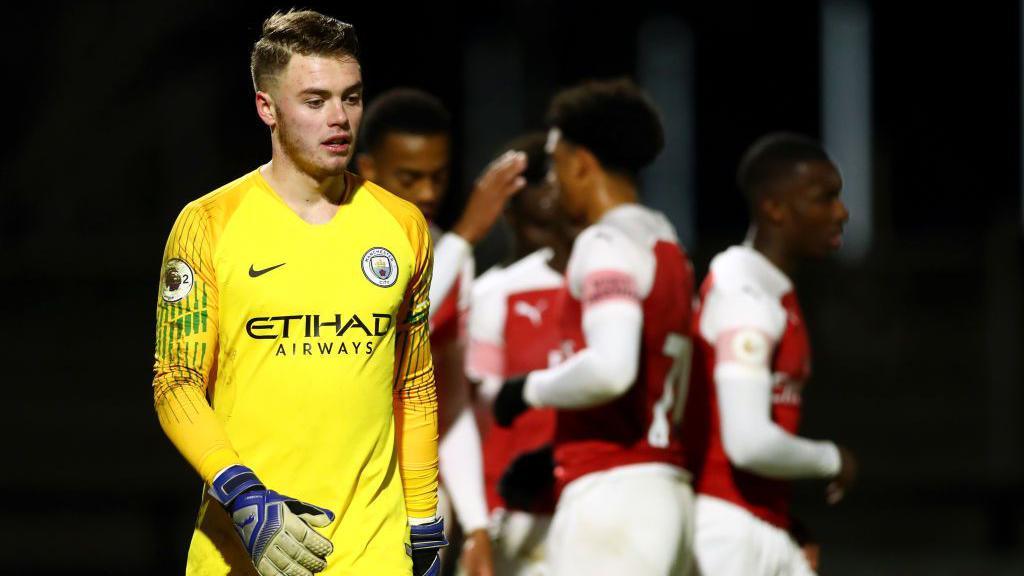The World Cup winner who quit football to help next generation

Joel Latibeaudiere, now at Coventry, and Manchester City's Phil Foden were Curtis Anderson's team-mates in 2017
- Published
It's not every day that a World Cup winner walks into a coffee shop in central Manchester.
Yet there is no crowd, no signing autographs or selfies with fans. Things have turned out differently for Curtis Anderson.
Anderson, a former Manchester City goalkeeper who helped England win the Under-17s Fifa World Cup in 2017, is able to sip his flat white in relative peace as he explains why he gave up his dream and became a financial adviser instead.
Of the 21 players who triumphed in India eight years ago, Anderson is the only one who is no longer playing football at any level.
Unlike most in his current field, Anderson is using his experiences in the game to help young professional footballers whose shoes he once stood in.
Anderson works for an independent financial adviser, where he heads the sports department.
Half of his time is spent exclusively with athletes - mainly footballers - helping them make informed financial decisions to maximise their earnings from a short career.
"You can literally change people's lives by taking money stresses away," Anderson tells BBC Sport.
"People don't understand simple things around finance so making things clearer for people and helping them keeps me motivated.
"I want to help as many people as possible. I'm so passionate about helping young football players."
Not too long ago, the 24-year-old was in the same position as those he now helps. So how did he end up here?
'The spark had gone'
On 28 October 2017, Anderson became a world champion.
Five months on from spending England's European Under-17 Championship campaign on the bench, Anderson didn't miss a minute as Steve Cooper's side reached the final of the U17 World Cup in India.
England had a squad including future Premier League regulars Phil Foden - who was named player of the tournament - Morgan Gibbs-White, Conor Gallagher, Callum Hudson-Odoi and Marc Guehi, and produced a remarkable comeback to beat Spain 5-2 after trailing 2-0.
"We were so relaxed and confident, nobody panicked," Anderson recalls.
"We pulled a goal back then went into half-time thinking 'we've got this'. There was no one getting stressed or going crazy in the dressing room."
Anderson was on top of the world but, by his own admission, he became impatient.

Anderson saved a spot kick as England beat Japan 5-3 on penalties in the last 16
Anderson sought a move away in search of more minutes, but was still at City when the transfer window closed after a loan move to a Championship club fell through.
With few options on the table, Anderson decided to join American side Charlotte Independence of the United Soccer League on a permanent basis in March 2019.
It was a decision he came to regret - three months later, the manager who signed Anderson was sacked, and he found himself out of favour.
"I look back and think, at 18, what was I in a rush for?" says Anderson.
"I was in such a desperate rush to do everything. I came off the back of the World Cup and expected everything now. I was looking at other young players, what they were doing, and not really valuing the path that I was on.
"Playing for City and England, my trajectory would have been straight up."
After a year on the books at Wycombe Wanderers, Anderson dropped down into non-league before retiring in 2023.
"The spark of football just wasn't really there," he says.
"I didn't have the same drive and love for it that I had five years earlier, I was happy to do my day job. The decision to fully stop playing came quite easily."

Anderson left Manchester City in 2019 to play in the United States
'Football gave me everything'
Like most footballers, Anderson started young.
His first taste of football came in his home town of Barrow-in-Furness, where he played both outfield and in goal for the under-six team coached by his dad.
Before long he was scouted by Blackpool, where he played until the two Manchester giants came calling.
Manchester United and City both wanted the 11-year-old, but he and his family were swayed by the latter's plans for the state-of-the-art City Football Academy.
Moving from a small town in Cumbria to a new city and an elite club was a daunting experience, but one Anderson feels helped him develop as a person and switch careers years later.
"Being in a high performance environment every single day, where you try to achieve the highest level, working as hard as you can and being called out if you're not at the level - not many kids are exposed to that," he says.
"It shapes you as a person. When I look back at my football career, people ask me if I regret it but absolutely not.
"Football gave me absolutely everything, in terms of exposure and the opportunity to mature really young."
'I have no regrets'
When the coronavirus lockdown left Anderson unable to find a new club, he started wondering how the money he had earned at City had dwindled away.
"I remember being 17 and not knowing what to do with the money, it was a daunting thing," he says.
Anderson passed accountancy and finance exams after contacting the Professional Footballers' Association for guidance.
He decided that path wasn't for him, which led to him shadowing a financial adviser near his parents' house.
He's worked in financial planning and advice ever since, turning down several offers to return to the Football League as his heart wasn't in it.
His new pursuit provided a level of control and security - as well as purpose - that playing lower-league football could not.
"At Wycombe, I'd get questions from older players," he says. "I realised there is a lack of education and support about finance in football.
"There's not enough education, guidance and support for young people with high earnings.
"If you're a lower-league player, your immediate priority should be to plan for life after football. If you've got that sorted, you can set yourself and your family up for years.
"I look at what I know now and feel like I need to help as many people in football as I can."
But when he sees his former England team-mates succeeding at the top of the game, does he have any regrets?
"I'm proud to see them doing so well, I don't sit there and think I wish I was doing that, or what could have been," he says.
"I've got no regrets and I'm not envious. I just stopped enjoying it. If you offered to put me in their situations now, playing week-in week-out in the Premier League, I wouldn't trade that for what I'm doing now.
"When I look at my football career, it gave me the opportunity to do what I do now. There aren't many financial advisers under 25 - or not many good ones anyway!"